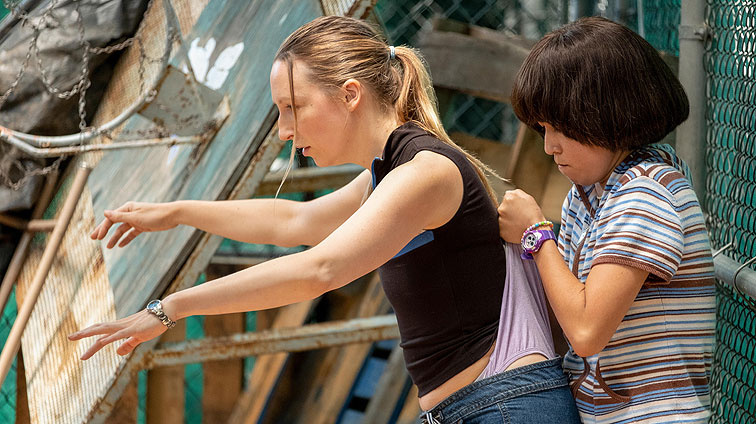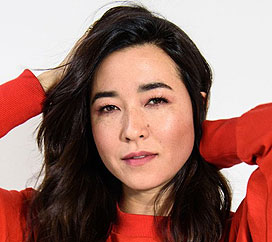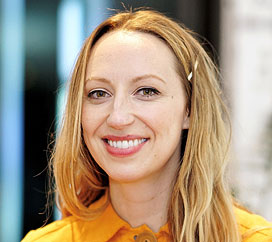
The Buddy System
PEN15’s co-creators/stars Maya Erskine and Anna Konkle are real-life best friends who bonded through writing and being brutally honest about how heartbreaking and hysterically funny life is for 13-year-old girls.
 Jillian Sollazzo
Maya Erskine
Jillian Sollazzo
Maya Erskine
 Katherin Pekala
Anna Konkle
Katherin Pekala
Anna Konkle
I feel like a writer first. I feel like that’s what I wanted to do somewhere deep inside all these years, but I couldn’t hear it.
– Anna KonkleMaya Erskine and Anna Konkle, the co-creators (with Sam Zvibleman) and stars of Hulu’s hit second season show PEN15 are a few minutes late for this phone interview. Not because they think they’re hot shots (although they pretty much are), but because they were on the phone with each other and, having so much fun, they kinda forgot the time. Full disclosure: they’re maybe four minutes late and sincerely apologetic. It’s just important to understand that, like the 13-year-old braces-clad, puberty-stricken versions of themselves they portray on the show, Erskine and Konkle are total BFF’s in real-life too.
It’s all very meta—they use their actual first names for the show’s tween leads, often re-enacting therapy-level personal traumas from their own tender years. Erskine even has her real mother playing her mother (again?) on the show. The resulting series has attracted many ardent fans: Seth Rogan called it, “so fucking great and funny it’s almost maddening.” What makes the show’s humor heart-winning is its unvarnished verisimilitude. It lays bare the realities of being a 13-year-old girl with an unflinching candor that TV simply hasn’t seen before, and in the process gives the threadbare coming-of-age comedy a needed infusion of new life. When first conceiving the show some seven years ago, Konkle and Erskine committed to totally “go there,” from Maya’s failed, toilet-clogging attempts to mitigate the utterly unanticipated arrival of her period, to a character dubbed “Icebox” by classmates after being rumored to have masturbated with an ice cube. Icebox, like many things in PEN15, isn’t just a bit, it’s something that really happened to a young Konkle, who, after accepting a dare to put an ice cube in her pants, was falsely rumored to have done much more. Years later, in her early 20s, she’s said she still got “Hey, Icebox” texts from former classmates back in her hometown. It was an event that caused real shame for years that she’s converted into emancipating, triumphant comedy. Dubbed cringe comedy by some for its TMI ethic, PEN15 doesn’t play crude or salacious details for cheap laughs, banking correctly that the honest humanity of it all is much funnier and compelling.
And while 33-years-old playing 13-year-olds alongside real 13-year-old actors could easily veer into sketch humor, they decided not to play it that way, opting for a straight-up approach. As a result, their adult height and bodies become a physical amplification of their characters’ feelings of desperate awkwardness. It also allows Konkle and Erskine to go to hard, even humiliating, places themselves instead of asking a real 13-year-old actor to do it for them.
The pair spoke with the Writers Guild of America West website about how being each other’s muse helps them write, why total trust allows them to be brutally honest, and how, right up to the debut of season one, they had no idea how their playing 13-year-olds would land with audiences.
(SPOILER ALERT: There are spoilers in this Q&A regarding PEN15's second season.)
It’s kind of surprising how much you being 30-somethings playing 13-year-olds adds to the story. Did you realize you wanted to do it that way from the jump, and how much has it surprised you how well it works?
Anna Konkle: The part that felt like a bit of a revelation in the beginning was realizing that, at the time, the content that we could think of that was readily available about 13-year-old experiences and girl experiences were like teeny-bopper shiny, mostly innocent, for kids about kids. We realized that there’s this trough of comedy and sadness that wasn’t being talked about in the media at least. We could tell stories until we’re blue in the face about the first time we’re fingered, or how our nipples came before our breasts, and as we were talking about them like, “Oh, this is really funny!” and, “I’ve never talked about this with anybody! I didn't know other people experienced this,” and that kind of kept happening. So I’m surprised it worked. The whole time we were like, “Who knows if this is going to work?” But we became aware that there was this void of truth around that subject. Does that sound right, Maya?
Maya Erskine: Yeah, exactly right. The surprise was that the experiment of us playing the 13-year-olds worked. The idea of the actual show delving into middle school and showing the R-rated, uncensored version of it, that felt worth pursuing for us, that was definitely like, there is a void here. That’s what gave us the strength to keep doing it for seven years without it ever going anywhere, because we believed in that so much.
It's kind of unbelievable how that big a void there still was in 2020…But to the point of you portraying 13-year-olds, did you know from the beginning you were going to do it that way, and how much has the fact that it works so well surprised you?
Maya Erskine: Anna and I came from theater and acting, so we had always sought out writing [as a way to] create our own work and opportunities to play characters. We were drawn to playing freaks and outcasts and really having fun with character work. That’s how we came into the idea of PEN15—"What is the ultimate freak for us to play? Oh, that’s 13-year-olds. That was me at my freakiest.” So we started there, and I remember as we were writing it, we realized that it helped in terms [the fact that], we were going to be doing adult things, we can’t watch kids do these things legally, and I don’t think the audience wants to watch that, but we want to show that.
But of course, we thought, this could really come off as a sketch, and we really didn’t want that. So when we did do it the first time, I would even say when we made the pilot presentation, it veered a little more sketch-like. We wanted to stay true to middle school and be as real as possible. We always knew that even if we stood out as adults or didn’t blend in with our castmates, that that would lend itself to the story because we are outcasts. That was something that we leaned on for comfort, thinking, I don’t know, it might not work, but let’s hope it helps the story. Once it came out and people weren’t like, “Oh, this is bullshit,” we were surprised. I mean, we tried our best, and we didn't really know how well it would work. As it went on, we realized that it just helps tell the story in ways that we didn't even think about initially. It lends itself to comedy being paired with a younger kid, it lends itself to pain and awkward moments and all of these things, being an adult, and we had enough distance as adults to add another layer to it.
Anna Konkle: It’s also interesting because it’s far easier writing…I don't know if it’s easier, but there’s something about writing the gritty secrets and shame for yourself, versus for a real 13-year-old… It’s real uncomfortable asking them to go through that on camera, while they’re probably going through that on some level off camera.
Have there been moments during writing this that got genuinely hard, some place you didn’t want to go, something that you didn’t want to reveal, or something that was upsetting that was brought up or triggering?
Anna Konkle: Yeah, for sure. Sometimes it’s a surprise because our writers’ room—especially me and Maya—are abnormally comfortable offering secrets and shame and sometimes stuff you haven’t told anybody. Maybe that’s partly out of fear of guaranteeing that the show continues to expand. It’s like, what other harrowing shit have I been through? But this storyline with my parents this year was in some ways really cathartic. I mean, I talked about this in another interview, so it’s not new information, but my dad got really sick in the middle of filming, and he passed away. Someday I will write about doing those scenes with my TV dad that I had written in bed about, like, the type of corduroys he’s wearing, and the car he had, everything has to exactly match and then all of a sudden, I’m going back in life and the moment when we were in the car, it’s the last scene, it's like a sad moment—I just watched it actually last night, Maya, so that’s probably why I’m bringing this up—but that moment was sad as a 13-year-old, with my dad telling me, “I'm moving out, and you’re going to have to choose who you’re going to live with…” That was a feeling of abandonment, like, he’s not going to be in my home anymore and that’s heartbreaking to a child. And yet I was almost longing in that moment for it to happen again. I was literally reliving a memory, and usually I’d be like, Oh, why do I do this to myself? I’m living this painful memory. But this time I didn’t want it to end, you know what I mean? I wanted it to keep it going. So very, very trippy year on that front.
Maya Erskine: Because she was gone, taking care of her father, and we had to start filming, we couldn't push it. When she came back, it was as if all your scenes with your father were there, like this odd scheduling where, looking back now, it's like, “Oh my God, how did you get through that?”
That's heart-rending and brutal. This is probably a dumb question, were those scenes in any way helpful or therapeutic?
Anna Konkle: I mean, I don't know if it was helpful except it helped me learn how to compartmentalize more. It did bring unexpected, joyful moments in the sense that there were times when I got to be lost and being with my dad again…But at the end of the day, the fact that I’m experiencing that as a human being, what a weird, trippy dream world I had this year that we created for ourselves?
Oh my God, yeah.
Maya Erskine: You’re still going through a grieving process while…
Playing your 13-year-old self.
Maya Erskine: It’s just insanity. What’s interesting, like Anna said, in terms of the writing process, there might be a couple moments where we go, “Is this going too far?”
Anna Konkle: Right.
Maya Erskine: That came up more in the first season, “Can we show this?” But because we were encouraged by each other to say, “Yes, this is great to put in here,” it makes you blind to your embarrassment or shame for that moment because you’re being supported by someone in that process of letting that out and writing it. It’s not until the show's about to come out you go, “Oh fuck! I can’t believe I’m masturbating in front of everyone, like, how did that happen?”
You are kind of each other's circle of trust, and there are no second thoughts about it.
Anna Konkle: Not in the room so much…
Maya Erskine: No.
Anna Konkle: But then sometimes on set it's like, “Oh, I don’t want to do this today.”
Maya Erskine: Right.
One thing I love about the show is that despite the heartbreaking, almost delusional quality of these girls, there’s always this unrelenting hope and creativity. They invent in the face of despair. Have either of you thought about that relative to your own creative drive as adults.
Anna Konkle: That’s a beautiful way of looking at it, so thanks for saying that. I feel like even with the pain you go through at that age, there’s still an innocence to them that allows them to just keep getting up again, the cynicism isn’t there yet.
And they have each other to continue basically playing make-believe with, or to find ways to continue to survive and have the courage to get up again. As much as some people say that PEN15 is cringy, or some people can’t watch it and all of that, to me it has been—like you were saying—more of a refuge from adult land. We get to be eternally optimistic even when it’s to our own demise, which is so funny and sad, but also so beautiful. The only reason they can do that is because they have each other, which I do think is a mirror reflection of the journey Maya and I have been on as adults. This has kind of been a whole additional adolescence, the past 10 years of our lives. We met when we were 20, 19, and now we’re 33, and it’s been wild. It was a wild five years of just being friends and being in New York, and auditioning for downtown theater, and then starting to write together and being business partners and family, and acting together. It is a reflection of PEN15 in a whole lot of ways.
Maya Erskine: Yeah, we’ve watched each other grow up. We marveled at that recently, how we’re finding ourselves turning more into adults, whatever that word means. While we still play 13-year-olds, we went through our awkward years together in a different way, the awkward years that you experience in your twenties and the transformation you’re going through when you’re finding yourself, but we’re doing it together. That’s exactly what Maya and Anna are doing at that age in the show. So yes, we didn't get to actually be friends at 13, but…we do get to be friends at 13, which is an amazing gift. I think about that scene in episode nine, where it’s the montage of us celebrating the love and excitement when your friend is sleeping over for three days. Yes, it turns into hell, but that moment in time where we’re hugging each other and running around and screaming, the extreme joy and the unabashed love we show for each other, to be able to live that out as adults is so liberating.
As actors, have you always wanted to write? Give us a rough idea of how much writing you guys did prior to the show.
Maya Erskine: The theater company, or studio I was in was all about composing your own work and writing with a more experimental edge, but that sort of introduced the idea in my head that I could possibly write. But I had no confidence in myself as a writer until I started working with Anna. She saw something in me that I couldn’t see in myself and that built the confidence to keep writing and to keep exploring. I found that I loved writing when I had someone in mind like Anna. If I was writing for her to read, or if I was writing for her to perform it, it was a whole different game.
Anna Konkle: I saw actors on TV, and the writers were hidden, and I didn’t grow up in a place where there were a lot of working artists. So I knew from a young age that I wanted to be an actor, and I was always pretending. The pretending in PEN15 isn’t a coincidence, Maya and I both loved pretending as kids. After college, being really confused and basically quitting acting, I had no idea what I wanted to do and started writing on my own because that made me happy for the day. Then I started writing a play or I started writing this or that, but the structure was never there. I enjoyed writing dialogue and characters and stuff, but it never went anywhere. I'd get halfway through something and be like, Where is this going? So it just wasn’t the goal at all.
But then starting to write with Maya was a new feeling that felt so, so right and I wanted to write for her. I wanted to write comedy for her, and I was definitely coming off of feeling pretty depressed. Maybe that was a part of it too—it was just this natural antidepressant of writing with you and writing comedy for you. And now I feel like a writer first. I feel like that’s what I wanted to do somewhere deep inside all these years, but I couldn’t hear it.
© 2020 Writers Guild of America West
